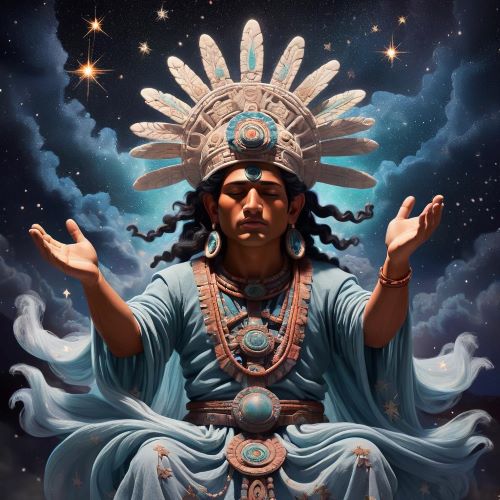Zapotec Gods
The Zapotec Gods form a central part of the ancient Zapotec civilization’s mythology, originating in the Valley of Oaxaca in what is now southern Mexico. These deities represent the forces of nature, agriculture, fertility, and death, reflecting the deep connection between the Zapotec people and their environment. Their mythology was not just a collection of stories—it was a guide to life, governance, and the cycles of time. The gods were honored through rituals, offerings, and elaborate ceremonies, many of which were tied to the agricultural calendar. These practices helped maintain balance in both the physical and spiritual worlds.
Zapotec Gods were often depicted in codices and temple carvings, showcasing their distinct visual identities and symbolic traits. Some of the most well-known deities include Cocijo, the god of rain and lightning, and Pitao Cozobi, the god of maize. Cocijo, with his jaguar features and lightning bolts, was especially revered for his power to bring the rains needed for successful harvests. Pitao Cozobi, representing sustenance and abundance, was central to many rituals during planting and harvest seasons. The pantheon also included gods of death, like Coqui Bezelao, who ruled over the underworld and guided the souls of the departed.
Each Zapotec god had unique domains and responsibilities, often linked to essential aspects of daily life. The gods were also associated with the Zapotec calendar system, which combined solar and ritual cycles. Specific deities governed different time periods and influenced events in both the natural world and human affairs. The alignment of divine will with calendrical events was considered critical for ensuring prosperity, peace, and cosmic order. Priests played a vital role in interpreting the gods’ messages and leading the community in worship, using rituals to communicate with the divine realm.
While some of the gods resemble deities from other Mesoamerican mythologies, the Zapotec Gods stand out for their unique traits and roles within their cultural context. Influences from neighboring cultures such as the Mixtec and the Aztec are present, but the Zapotecs maintained a distinct religious identity. Their sacred cities, such as Monte Albán and Mitla, were built to align with celestial movements and acted as ceremonial centers where gods were worshipped and community rituals performed. Temples and tombs often featured intricate carvings and symbolic artwork devoted to the gods.
Today, the legacy of Zapotec Gods continues to inspire interest in Mesoamerican mythology and cultural history. Archaeological discoveries and scholarly research have brought many of these deities back into focus, allowing us to appreciate their role in shaping ancient Zapotec society. Elements of Zapotec spiritual beliefs persist in the traditions of modern Zapotec communities, blending ancient practices with contemporary life. As we explore these fascinating gods, we uncover not just stories, but a profound worldview shaped by reverence for nature, time, and the unseen forces that govern the universe.
The Zapotec Gods form a central part of the ancient Zapotec civilization’s mythology, originating in the Valley of Oaxaca in what is now southern Mexico. These deities represent the forces of nature, agriculture, fertility, and death, reflecting the deep connection between the Zapotec people and their environment. Their mythology was not just a collection of stories—it was a guide to life, governance, and the cycles of time. The gods were honored through rituals, offerings, and elaborate ceremonies, many of which were tied to the agricultural calendar. These practices helped maintain balance in both the physical and spiritual worlds.
Zapotec Gods were often depicted in codices and temple carvings, showcasing their distinct visual identities and symbolic traits. Some of the most well-known deities include Cocijo, the god of rain and lightning, and Pitao Cozobi, the god of maize. Cocijo, with his jaguar features and lightning bolts, was especially revered for his power to bring the rains needed for successful harvests. Pitao Cozobi, representing sustenance and abundance, was central to many rituals during planting and harvest seasons. The pantheon also included gods of death, like Coqui Bezelao, who ruled over the underworld and guided the souls of the departed.
Each Zapotec god had unique domains and responsibilities, often linked to essential aspects of daily life. The gods were also associated with the Zapotec calendar system, which combined solar and ritual cycles. Specific deities governed different time periods and influenced events in both the natural world and human affairs. The alignment of divine will with calendrical events was considered critical for ensuring prosperity, peace, and cosmic order. Priests played a vital role in interpreting the gods’ messages and leading the community in worship, using rituals to communicate with the divine realm.
While some of the gods resemble deities from other Mesoamerican mythologies, the Zapotec Gods stand out for their unique traits and roles within their cultural context. Influences from neighboring cultures such as the Mixtec and the Aztec are present, but the Zapotecs maintained a distinct religious identity. Their sacred cities, such as Monte Albán and Mitla, were built to align with celestial movements and acted as ceremonial centers where gods were worshipped and community rituals performed. Temples and tombs often featured intricate carvings and symbolic artwork devoted to the gods.
Today, the legacy of Zapotec Gods continues to inspire interest in Mesoamerican mythology and cultural history. Archaeological discoveries and scholarly research have brought many of these deities back into focus, allowing us to appreciate their role in shaping ancient Zapotec society. Elements of Zapotec spiritual beliefs persist in the traditions of modern Zapotec communities, blending ancient practices with contemporary life. As we explore these fascinating gods, we uncover not just stories, but a profound worldview shaped by reverence for nature, time, and the unseen forces that govern the universe.

